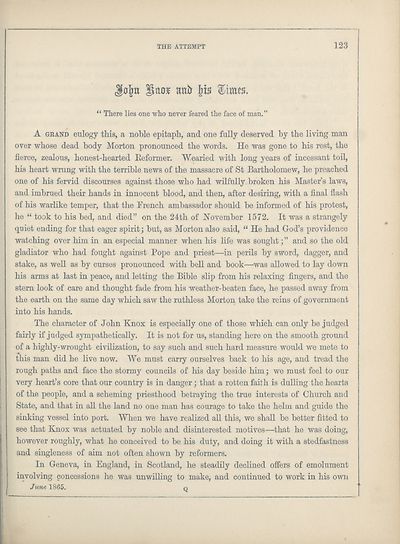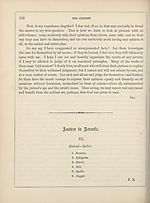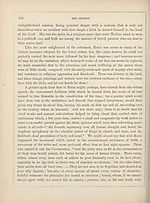Attempt > Volume 1 and Select writings
(135) Page 123
Download files
Complete book:
Individual page:
Thumbnail gallery: Grid view | List view

THE ATTEMPT
123
Jfoljn twir
“ Tliere lies one who never feared the face of man.”
A grand eulogy this, a noble epitaph, and one fully deserved hy the living man
over whose dead body Morton pronounced the words. He was gone to his rest, the
fierce, zealous, honest-hearted Eeformer. Wearied with long years of incessant toil,
his heart wrung with the terrible news of the massacre of St Bartholomew, he preached
one of his fervid discourses against those who had wilfully broken his Master’s laws,
and imbrued their hands in innocent blood, and then, after desiring, with a final flash
of his warlike temper, that the French ambassador should be informed of his protest,
he “ took to his bed, and died” on the 24th of November 1572. It was a strangely
quiet ending for that eager spirit; but, as Morton also said, “ He had God’s providence
watching over him in an especial manner when his life was soughtand so the old
gladiator who had fought against Pope and priest—in perils hy sword, dagger, and
stake, as well as hy curses pronounced with bell and hook—was allowed to lay down
his arms at last in peace, and letting the Bible slip from his relaxing fingers, and the
stern look of care and thought fade from his weather-beaten face, he passed away from
the earth on the same day which saw the ruthless Morton take the reins of government
into his hands.
The character of John Knox is especially one of those which can only be judged
fairly if judged sympathetically. It is not for us, standing here on the smooth ground
of a highly-wrought civilization, to say such and such hard measure would we mete to
this man did he live now. We must carry ourselves back to his age, and tread the
rough paths and face the stormy councils of his day beside him; we must feel to our
very heart’s core that our country is in danger; that a rotten faith is dulling the hearts
of the people, and a scheming priesthood betraying the true interests of Church and
State, and that in all the land no one man has courage to take the helm and guide the
sinking vessel into port. When we have realized all this, we shall be better fitted to
see that Knox was actuated by noble and disinterested motives—that he was doing,
however roughly, what he conceived to be his duty, and doing it with a stedfastness
and singleness of aim not often shown by reformers.
In Geneva, in England, in Scotland, he steadily declined offers of emolument
involving concessions Ire was unwilling to make, and continued to work in his own
June 1865. o
123
Jfoljn twir
“ Tliere lies one who never feared the face of man.”
A grand eulogy this, a noble epitaph, and one fully deserved hy the living man
over whose dead body Morton pronounced the words. He was gone to his rest, the
fierce, zealous, honest-hearted Eeformer. Wearied with long years of incessant toil,
his heart wrung with the terrible news of the massacre of St Bartholomew, he preached
one of his fervid discourses against those who had wilfully broken his Master’s laws,
and imbrued their hands in innocent blood, and then, after desiring, with a final flash
of his warlike temper, that the French ambassador should be informed of his protest,
he “ took to his bed, and died” on the 24th of November 1572. It was a strangely
quiet ending for that eager spirit; but, as Morton also said, “ He had God’s providence
watching over him in an especial manner when his life was soughtand so the old
gladiator who had fought against Pope and priest—in perils hy sword, dagger, and
stake, as well as hy curses pronounced with bell and hook—was allowed to lay down
his arms at last in peace, and letting the Bible slip from his relaxing fingers, and the
stern look of care and thought fade from his weather-beaten face, he passed away from
the earth on the same day which saw the ruthless Morton take the reins of government
into his hands.
The character of John Knox is especially one of those which can only be judged
fairly if judged sympathetically. It is not for us, standing here on the smooth ground
of a highly-wrought civilization, to say such and such hard measure would we mete to
this man did he live now. We must carry ourselves back to his age, and tread the
rough paths and face the stormy councils of his day beside him; we must feel to our
very heart’s core that our country is in danger; that a rotten faith is dulling the hearts
of the people, and a scheming priesthood betraying the true interests of Church and
State, and that in all the land no one man has courage to take the helm and guide the
sinking vessel into port. When we have realized all this, we shall be better fitted to
see that Knox was actuated by noble and disinterested motives—that he was doing,
however roughly, what he conceived to be his duty, and doing it with a stedfastness
and singleness of aim not often shown by reformers.
In Geneva, in England, in Scotland, he steadily declined offers of emolument
involving concessions Ire was unwilling to make, and continued to work in his own
June 1865. o
Set display mode to: Large image | Transcription
Images and transcriptions on this page, including medium image downloads, may be used under the Creative Commons Attribution 4.0 International Licence unless otherwise stated. ![]()
| Ladies' Edinburgh Debating Society publications > Attempt > Volume 1 and Select writings > (135) Page 123 |
|---|
| Permanent URL | https://digital.nls.uk/109866574 |
|---|
| Attribution and copyright: |
|
|---|

